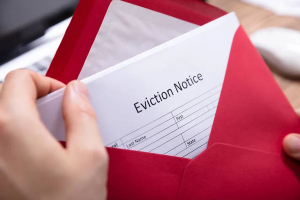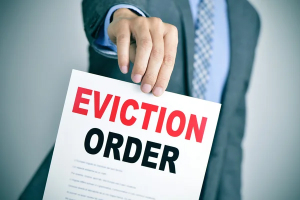
Navigating the eviction process in San Francisco can be overwhelming for tenants. With countless legal nuances and procedures, understanding your rights and responsibilities is essential. Halavanau Injury and Accident Law is here to guide you through the intricacies of San Francisco's eviction rules.
There are many types of evictions in San Francisco, but the landlord must follow the legal eviction process. The San Francisco eviction process to remove a tenant is detailed, and the San Francisco Rent Board spells out your rights. Our eviction defense team is here to help you.
Learn more about how a wrongful eviction is defined under San Francisco, California law. Then, reach out to us to schedule a consultation and discuss your eviction protections.
Eviction in San Francisco is a legal process allowing landlords to reclaim their property from tenants under specific conditions. However, this process isn't straightforward. Before any eviction action can be taken, landlords must provide a valid reason and proper notice. Tenants also have rights, including the opportunity to rectify specific issues, depending on the grounds for eviction.
Furthermore, the eviction process is guided by the San Francisco Rent Ordinance, which gives certain protections to tenants. This ordinance, in combination with state laws, ensures that evictions are carried out fairly. With multiple steps involved, from serving notice to attending court hearings, the process demands a precise understanding of both municipal and state regulations.

The tenant-landlord relationship in San Francisco is built on mutual respect, rights, and responsibilities. When both parties fulfill their obligations, this relationship thrives. Tenants are responsible for respecting the property and the lease terms, while landlords are required to provide safe and habitable living conditions.
On the other hand, when disputes arise, they often stem from misunderstandings or neglect of one's responsibilities. For tenants, understanding your rights and obligations can prevent potential conflicts. For landlords, respecting tenant rights and staying updated on the latest regulations is vital for smooth property management.
Every tenant in San Francisco has the right to a safe and habitable living space. This means landlords must address any necessary repairs or maintenance issues promptly. In addition, tenants have the right to privacy, which means landlords can't enter the property without proper notice or a valid reason.
However, with rights come responsibilities. Tenants must pay rent on time, adhere to the terms of their lease, and maintain the property, ensuring it's in the same condition as when they moved in. Damages beyond normal wear and tear could lead to deductions from the security deposit or even eviction.
On the other hand, landlords have the right to receive timely rent payments and expect their property to be maintained adequately. They can also set terms and conditions in the lease, provided they don't violate any laws. Furthermore, landlords can take eviction action if a tenant violates the lease or defaults in paying rent.
However, landlords also have significant responsibilities. They must ensure the rental property is habitable and adheres to health, safety, and building codes. Immediate action should be taken for any repairs or maintenance issues. Failing to address these can lead to legal consequences.
A lease agreement is a legally binding contract that establishes the relationship between the tenant and the landlord. It outlines the terms and conditions of the rental, including rent amount, lease duration, and property rules. Adhering to the lease is vital for both parties to avoid conflicts.
Breaking any term in the lease, such as non-payment of rent, can lead to potential eviction for the tenant. On the other hand, landlords must also abide by the agreement, ensuring they don't change the terms without the tenant's consent. A clear and comprehensive lease is the foundation of a harmonious tenant-landlord relationship.
In San Francisco, a landlord cannot evict a tenant without a valid reason. The city provides a specific list of "just causes" for eviction to ensure fairness in the process. This approach seeks to protect tenants from arbitrary evictions while allowing landlords to reclaim their property under valid circumstances.
No-fault evictions are situations where the tenant hasn't necessarily done anything wrong, but the landlord has a valid reason to reclaim the property. These can include reasons like substantial renovations, where the tenant has to vacate. In such cases, landlords often have to provide relocation assistance to the evicted tenant.
In addition, specific properties in San Francisco are under rent control, meaning they have extra protections against no-fault evictions. Understanding these nuances is essential for both landlords and tenants to ensure the eviction process is fair and legal.
Rent control in San Francisco limits how much a landlord can increase the rent for certain properties. These regulations ensure that the city remains affordable for tenants. For properties under rent control, eviction rules are even stricter, offering more protection to tenants.
Landlords can't use tactics like skyrocketing the rent to force a tenant out. Evictions for such properties require a valid just cause, and tenants have more rights to contest any eviction attempts.

Before any eviction action is taken, landlords must provide tenants with a proper legal notice. This notice outlines the reason for the eviction and provides a timeframe for the tenant to address the issue. Ignoring this requirement can lead to the eviction being deemed invalid.
Different eviction grounds require different notices. For example, non-payment of rent might give a tenant three days to pay the due amount or face eviction. On the other hand, a no-fault eviction might require a more extended notice period, giving the tenant more time to find alternative accommodations.
Landlords must ensure that eviction notices are served correctly. This can be done personally, by mail(in certain instances), or through a third party. The notice should clearly state the reason for eviction and the required action or remedy.
On the tenant's side, it's crucial to understand the notice and take timely action. If you believe the eviction notice is unjust, seeking legal counsel is crucial. We can help.
A. Tenant Options and Rights
Upon receiving an eviction notice, tenants have several options. They can comply by paying the owed rent, fixing the lease violation, or moving out. Tenants also have the right to contest the eviction if they believe it's unjust or if the landlord fails to follow the proper process.
B. Responding to Eviction Notices
A timely response is crucial. Tenants can either address the issue outlined in the notice or, if they believe the eviction is unjust, seek legal help. Not responding can result in a default judgment in favor of the landlord.
C. Legal Defenses Against Eviction
San Francisco offers multiple defenses against eviction. These include claims that the landlord failed to maintain habitable premises, retaliatory eviction, or that the eviction notice was improperly served, as some examples.

A. Filing an Unlawful Detainer Lawsuit
If a tenant doesn't comply with the eviction notice, the landlord may commence an unlawful detainer lawsuit. This is the legal method to reclaim the rented property. The process is swift, but landlords must follow every procedural requirement.
B. The Court Process and Timeline
Once the lawsuit is filed, a court date is set. Both parties present their case, and the judge makes a decision. This process is usually faster than other civil cases, often concluding within 20 days.
C. Mediation and Settlement Options
Before going to court, both parties can consider mediation. This involves a neutral third party helping them reach a settlement. Mediation can be less stressful and more cost-effective than a full-blown court case.
A. Importance of Legal Counsel
Having legal representation can significantly impact the outcome of an eviction case. A knowledgeable attorney can help tenants understand their rights and present a robust defense in court.
B. Access To Free or Low-Cost Legal Services
San Francisco offers several programs providing free or low-cost legal services for tenants facing eviction. These services can be invaluable for those who cannot afford private legal representation.
C. Preparing for Court Hearings
Having all the necessary documents, evidence, and a clear understanding of eviction laws can make a big difference. Legal representation ensures that a tenant's rights are upheld during court hearings.
Facing eviction can be a daunting experience. But with the right eviction lawyer by your side, you can confidently navigate the challenges. Our lawyer at Halavanau Injury and Accident Law offers the following:

Understanding eviction laws in San Francisco can be complex. But with proper counsel and representation, you can confidently protect your rights and navigate the process. Our tenant lawyer is here to help. We may even be able to help you recover compensation for relocation payments.
Our dedicated Halavanau Injury and Accident Law team has the expertise, experience, and passion to tackle even the most challenging eviction cases.
Contact us today, and let's start your journey to justice.
Schedule Your
Free Consultation
Request Your Free
Confidential Consultation